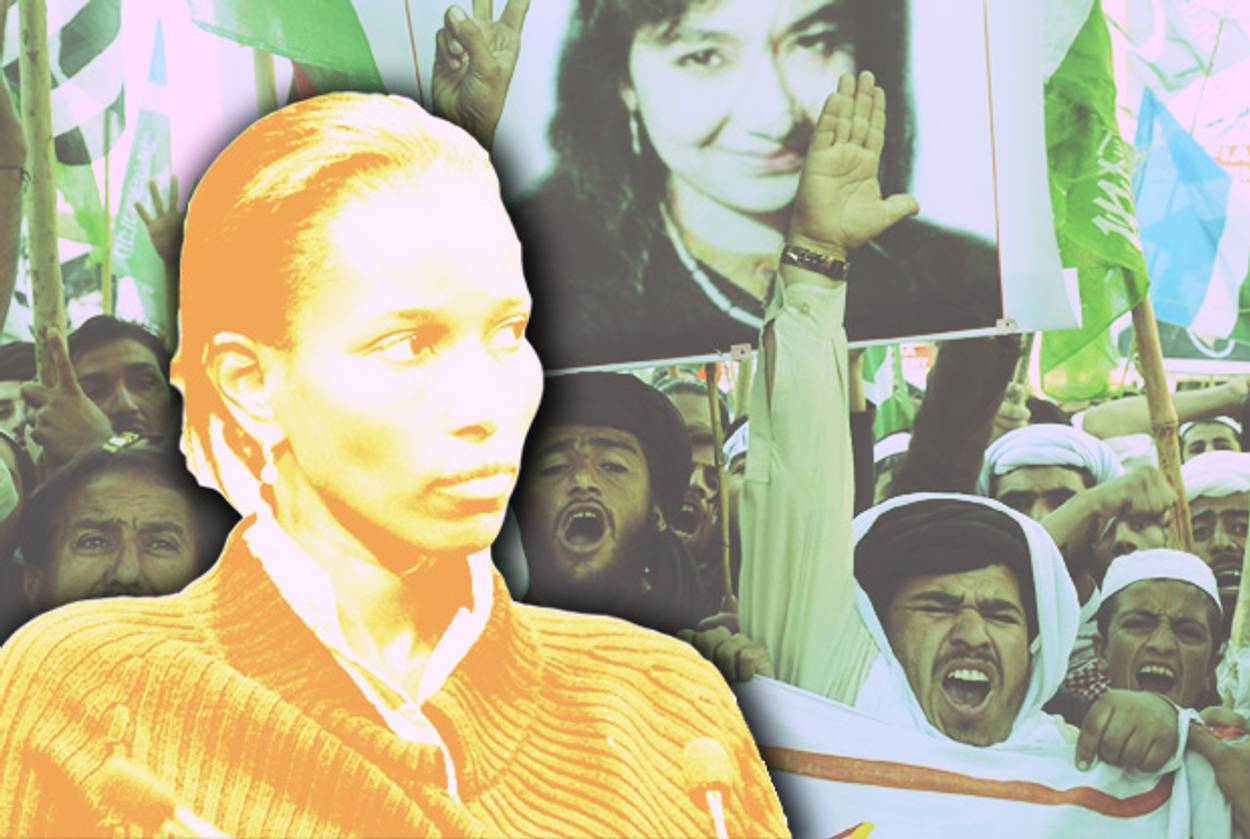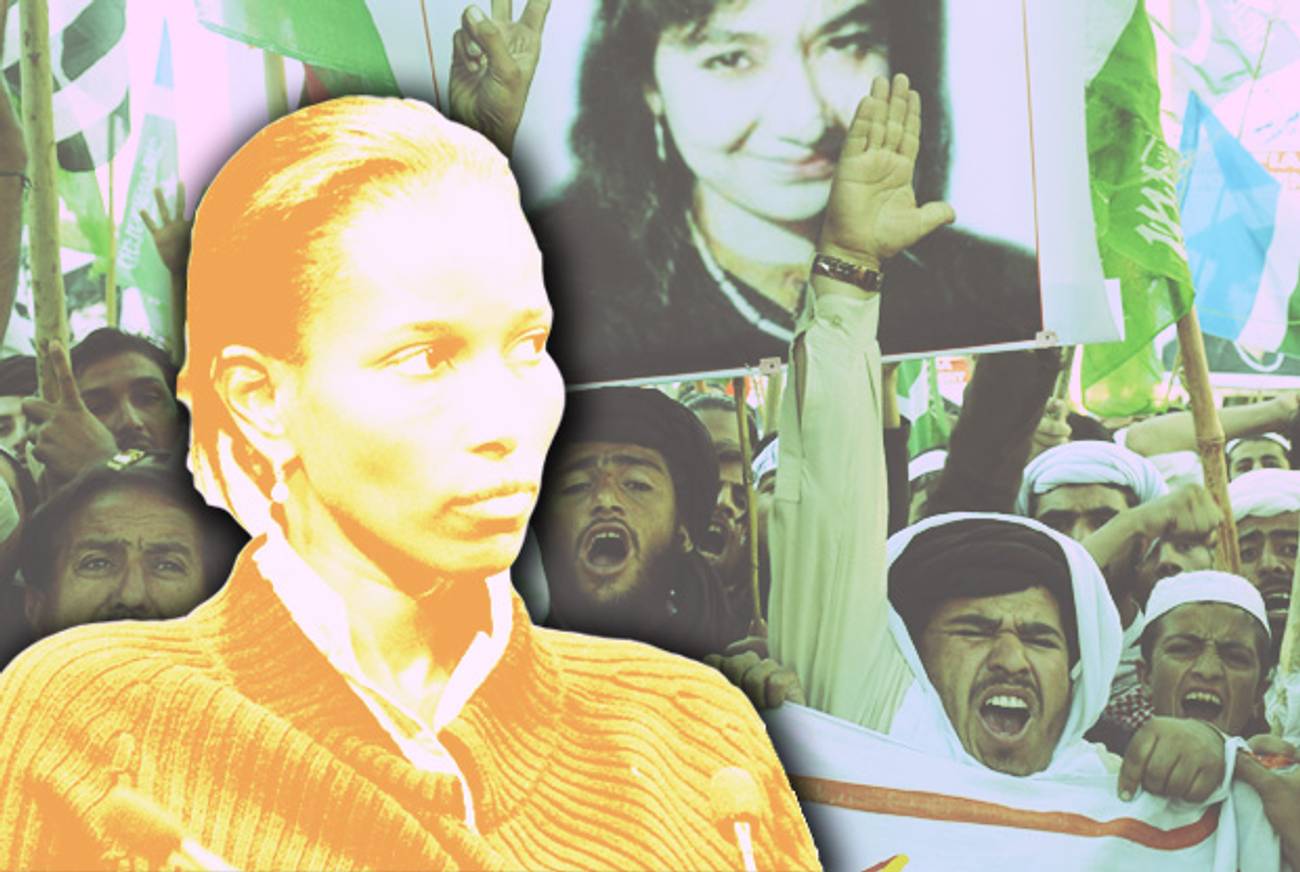Heroine Stupor
Wanted Women, a new joint biography of two Muslim women, refuses to distinguish between an al-Qaida terrorist and a feminist intellectual




There are occasionally some books that are so deeply unpleasant, indeed repulsive, that one feels like washing one’s hands after reading them. Dripping with unremitting bias, and utterly missing the big picture, such books leave one despairing of the moral vacuum in which they were written. Such a work is the American journalist Deborah Scroggins’ new book Wanted Women, which explicitly seeks to draw a parallel between the lives of two women she presents as “mirror images” in the war against terror: the Pakistani-born convicted Islamist terrorist Aafia Siddiqui and the Somali-born campaigner for Muslim women’s rights, Ayaan Hirsi Ali.
One understands immediately why Siddiqui might justify the term “Wanted” in the book’s title: She featured on the FBI’s Most Wanted Terrorists list in May 2004. Yet the only way in which the word applies to Hirsi Ali is that since a fatwa was pronounced upon her after the murder of her friend, the Dutch filmmaker Theo van Gogh, the same year, Islamic fundamentalists have wanted to murder her. It is precisely this loose, facile equation of a lawful, constitutional, democratic entity such as the FBI with vicious murderers like van Gogh’s killer Mohammed Bouyeri, who beheaded the filmmaker one November morning in Amsterdam, that makes this book so thoroughly objectionable. Besides a couple of mea culpa sentences that are clearly inserted for pro forma reasons, Scroggins’ entire leitmotif drips with despicable moral equivalism. She even devotes alternate chapters to each woman throughout the book.
The author’s obvious personal aversion to Hirsi Ali makes it seem that of the two women she is profiling, Scroggins is keener to explain away the actions of the terrorist rather than the target of terrorism. Hirsi Ali, readers will recall, is a human-rights activist who fights against forced female genital mutilation, decries so-called honor killings, and highlights the way the Quran justifies the mistreatment of women. Siddiqui is a viciously anti-Semitic terrorist serving 86 years in prison for attempted murder.
Throughout the book there is the assumption that political conservatives of all stripes are unthinking bigots and that “Westerners who want to keep the Muslim world under Western rule have used Islamic attitudes towards women not so much to help free Muslim women as to justify the West’s continued domination of Muslim men.” What complete unadulterated tripe. Westerners haven’t wanted to keep the Muslim world under Western rule since the Suez Crisis of 1956, and Islamic attitudes toward women genuinely disgust Westerners, male and female, conservative and—theoretically, at least—liberal. Lastly, where are these countries where Muslim men suffer “continued domination” by Westerners? Scroggins doesn’t name a single one. If anything, given many Muslim countries’ draconian laws, it is Jews and Christians who suffer “continued domination” almost throughout the entire Middle East—a phenomenon that the Arab Spring, tragically, shows no sign of alleviating.
Writing of a speech that Hirsi Ali was set to give, Scroggins alleges that “some of the anti-gay Islamic attitudes she planned to criticize weren’t very different from those of some conservative Republicans.” Really? Show me a bill in which conservative Republicans have attempted to change the law so that homosexuals are hanged, as happened to three gay men in Iran this past September. Those innocents were only the most recent victims of that country’s blood lust against homosexuals.
In alleging that Siddiqui and Ali are, as she puts it, “mirror images of each other,” Scroggins, a former award-winning foreign correspondent for the the Atlanta Journal-Constitution, ought to be able to produce serious factual evidence to back up her case. Yet her book is replete with tell-tale words and phrases that suggest that she is simply using guesswork to fill the enormous gaps in her knowledge that lie between the sources—often mere websites, magazine articles, and other books as tendentious as her own that she cites in her footnotes. Thus we get scores of weaselly phrases such as “it’s said,” “some of her friends wondered,” “by one account,” “she is said to have been,” “probably,” “must have been,” and “reported to be.” These are not good enough to support a sustained 539-page attack on Hirsi Ali, someone whom many people—including this reviewer—see as one of the bravest and most admirable women alive today.
Several of Scroggins’ attacks are self-contradictory. Hirsi Ali’s husband, the British historian Niall Ferguson, is accused of being “tight-fisted” but also of “reputedly picking up the tab for many thousands of dollars” at a birthday party for her. Hirsi Ali is likewise accused of going into “hiding” in America, but also of being constantly self-promoting and high-profile. The author’s relentless sneering—Hirsi Ali “wails” rather than argues—very quickly palls as a literary technique.
According to this book, Hirsi Ali has a “one-track mind”; she once used a ghost-writer; she’s had her hair straightened; she “joined the AEI choir” (i.e., agreed with many of the stances adopted by the American Enterprise Institute, the Washington-based think tank). Yet when one analyzes these attacks a bit more closely, they either collapse or fall resolutely under the heading: So What?
For, far from having a one-track mind, Hirsi Ali has, as her best-selling autobiographies Infidel and Nomad prove, led a rich, varied, fascinating, and courageous life. She has been a Dutch MP and is an accomplished public speaker. She has an interest in the arts, speaks several languages, has worked in an orange-juice factory and a cookie factory, has advised presidents and prime ministers, and is now the mother of a 1-month-old baby. How many more tracks does Scroggins demand? Now, if the same people who beheaded Daniel Pearl and Theo van Gogh were to put a fatwa on me, I might well develop a one-track mind. But it’s not true of Hirsi Ali.
Indeed, if the obsessive criticisms in this book are anything to go by, it is Scroggins herself—what a wonderfully Trollopian name, by the way—who suffers from the one-track mind. The way in which she tenderly recalls and reprises every negative review Hirsi Ali has ever received for her books—including rude picture captions from the gutter press—while skating over the admiring ones, also underlines the utter lack of objectivity in this book.
There are also no fewer than 15 pages devoted to Hirsi Ali’s supposed lying. The lies that Scroggins refers to Hirsi Ali making are about her age and full family name on her immigration form for entry into Holland, about which she herself has written at length long before Scroggins put her pen to paper. Of course a woman attempting to escape her family and religion was not about to put all her correct details on immigration forms—a thought that does not seem to have occurred to the ever-censorious Scroggins, who describes one of Hirsi Ali’s books (wrongly) as “a thin patchwork of heavily-edited opinion pieces,” which is ironically precisely what her own book is, except this work is not edited heavily enough. She as good as admits that she can’t back up her allegations that Hirsi Ali invented her arranged marriage to a cousin she had never met, and so we are left with a young lady desperate to escape her country, family, and faith telling two small lies to immigration officials. Let us therefore compare those essentially understandable white lies to the gross, sustained black ones told by Siddiqui in her trial two years ago, which Scroggins covers in less than three pages.
When Siddiqui was arrested in Afghanistan in July 2008 after five years on the run, she was in possession of a computer thumb drive containing plans for conventional weapons and WMD, notes on planned terrorist attacks written in her own handwriting, instructions on how to construct missiles that could shoot down drones, descriptions of New York landmarks containing references to mass casualties, and two pounds of sodium cyanide in a glass jar. At her jury selection in a Manhattan court in January 2010, she demanded that no one must be allowed to sit on the jury “If they have a Zionist or Israeli background. I have a feeling everyone here is them—subject to genetic testing.”
How—under such circumstances, and given the murder Siddiqui subsequently tried to commit with an M-4 assault rifle once captured by American and Pakistani forces—Scroggins can write, “If Aafia had listened to her lawyers, she might have been found not guilty,” is anyone’s guess. When Siddiqui took the stand, the prosecutor very soon caught her out lying about almost every single aspect of the shooting incident, and then about her life and career, just as al-Qaida operatives are trained to do. To compare that, as this book implicitly does, with Hirsi Ali not telling real-estate agents that she doesn’t like the houses they are showing her, is so pathetic as to be laughable. Yet, Scroggins writes, Siddiqui shows “piety” and “academic excellence.” While she raised money for a charity in Bosnia, Hirsi Ali is portrayed as mendacious and “free-spending.”
The forced clitoridectomy that Hirsi Ali underwent in Somalia at age 5 is treated with something akin to blithe disregard in this book, which states that her parents “probably didn’t regard female genital mutilation with the revulsion many Westerners felt.” There goes that word “probably” again, yet we do know that her father had stated that he did not want it to happen to his daughter. But because “nearly every woman they knew was infibulated,” Scroggins implies that they were making a fuss about nothing much, and perhaps feels that it’s a form of Western domination over Muslims to express revulsion over such traditional practices anyhow. “Like the bikini and the burka or the virgin and the whore,” writes Scroggins with breathtaking viciousness if one considers the context, “you couldn’t quite understand one without understanding the other.” Siddiqui wears the burka, so what does that sentence imply Hirsi Ali is?
Don’t bother reading this morally hollow book. If you do, keep water and plenty of soap nearby.
Andrew Roberts is a historian. His latest book is The Storm of War: A New History of the Second World War.
Andrew Roberts is a historian. His latest book is The Storm of War: A New History of the Second World War.